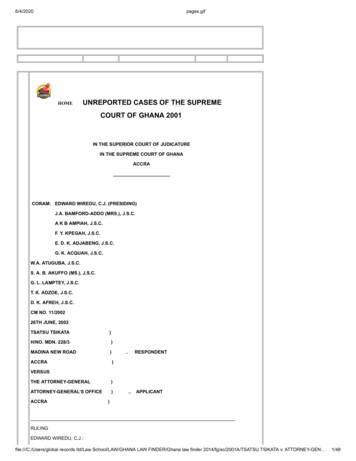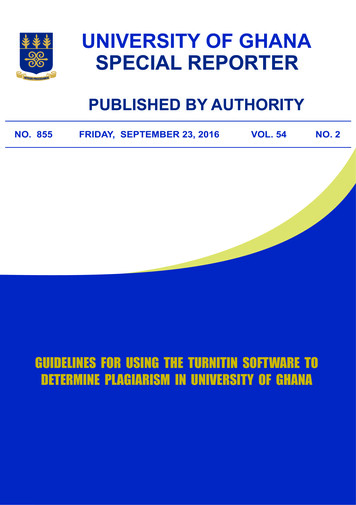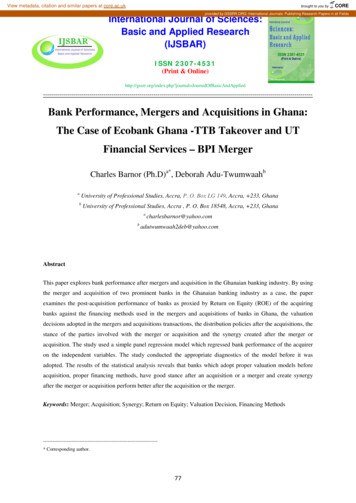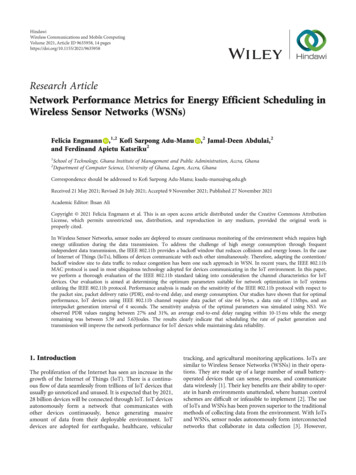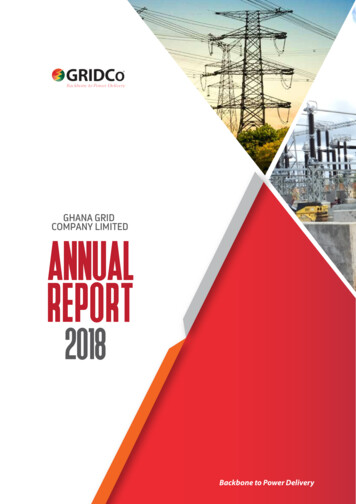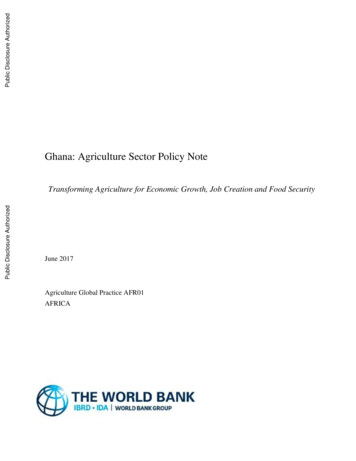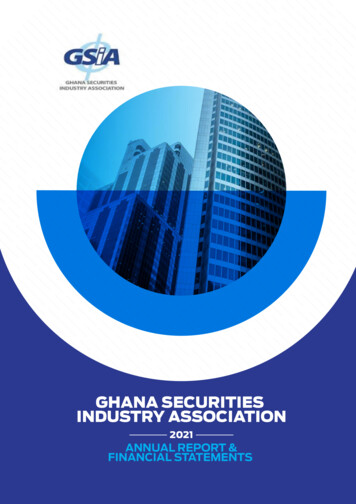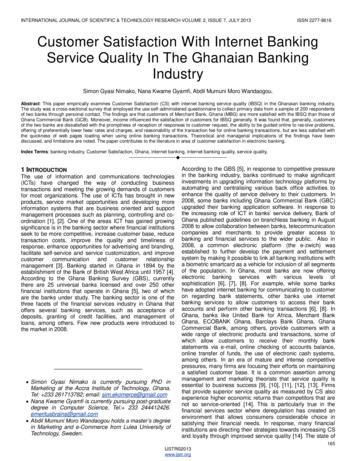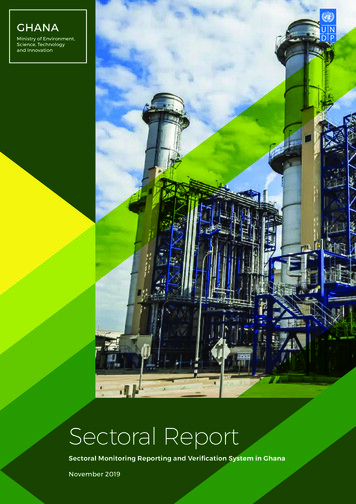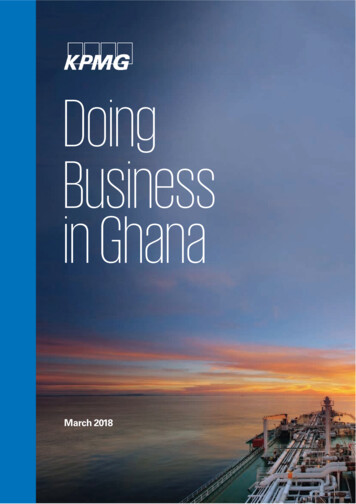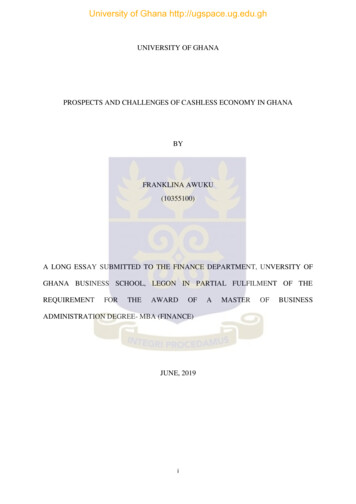
Transcription
University of Ghana http://ugspace.ug.edu.ghUNIVERSITY OF GHANAPROSPECTS AND CHALLENGES OF CASHLESS ECONOMY IN GHANABYFRANKLINA AWUKU(10355100)A LONG ESSAY SUBMITTED TO THE FINANCE DEPARTMENT, UNVERSITY OFGHANA BUSINESS SCHOOL, LEGON IN PARTIAL FULFILMENT OF THEREQUIREMENTFORTHEAWARDOFADMINISTRATION DEGREE- MBA (FINANCE)JUNE, 2019iAMASTEROFBUSINESS
University of Ghana http://ugspace.ug.edu.ghDECLARATIONI hereby, declare that this long essay is the result of my own original research towards theaward of Master of Business Administration, Finance option. No part of this work has beenpresented for another degree in this university or elsewhere. All references used in this workhave been fully acknowledge.Signature: .Date Name: Franklina Awuku(10355100)ii
University of Ghana http://ugspace.ug.edu.ghCERTIFICATIONI hereby certify that this thesis was supervised in accordance with procedures laid down bythis University. DR.LORDINA AMOAH(SUPERVISOR)iii
University of Ghana http://ugspace.ug.edu.ghDEDICATIONI dedicate this research work to my parents for choosing to give me the best education theycould and my amazing and always caring siblings for their loving support, care and prayersthroughout my two years at University of Ghana. I also dedicate this work to my loved onesfor all their support.iv
University of Ghana http://ugspace.ug.edu.ghACKNOWLEDGEMENTSI am grateful to the Almighty God who has been my guide throughout the MBA programme. I am grateful to my supervisor DR. Lordina Amoah for her comments, constructive criticismand suggestions to achieve the best quality of this research and writing of this thesis asuccess.My sincere thanks to Prince Kweku Boahen Success whose prayers, constructive criticismand motivation has sustained me thus far.I wish to also show my gratitude to all respondents who responded to the questionnaires.With regards to all those names I cannot mention who helped me one way or the other, i saythank you all , your contributions were not in vain may God bless you all.v
University of Ghana http://ugspace.ug.edu.ghABSTRACTThis study examined the prospects of Cashless Economy in Ghana. It also identifiedchallenges Ghana faces it goes cashless. Finally, it assessed stakeholders’ readiness forcashless economy. The study employed purposive sampling technique to select Ministry ofFinance (MoF), and Simple random technique to select 13 Universal Banks and 50 SMEs thatconstituted the sample size of the research. An interview guide assisted in extracting relevantinformation from MoF, whereas structured questionnaires were designed to facilitate theacquisition of relevant data from Universal Banks and SMEs. Descriptive statistics wasemployed to analyse and present data. The findings of the study revealed that cashlesseconomy enhances GDP growth. This was reinforced by benefits of cashless system forvarious stakeholders which include; ease in transactions by government, increased securityfor all partners, greater efficiency in the public sector, reduction in corruption in publicsector, 24/7 customer service, less congestion at offices, reduction in operational cost,increased bank efficiencies, fewer customers complaints, reduction in money Laundry,Convenience in business operation, enhancement of accountability, among others. The studyalso identified Cyber-attacks, high illiteracy rate, identity theft, unreliable networks, extratransaction charges as major challenges to cashless economy. Furthermore, the findingsrevealed that as Government was not fully ready to migrate Ghana to cashless, stakeholdersappeared to be ready for cashless system. It is recommended that government should partnerwith stakeholder and invest in cyber security and also provide educational platforms forbusinesses and citizens to equip themselves with technological knowledge in order tosafeguard against this threat. Again, government should engage banks and telecoms, in aways of providing incentives for them, introduce policy that would eliminate chargesassociated with transacting digitally.vi
University of Ghana http://ugspace.ug.edu.ghLIST OF TABLESTABLEPAGE4.1Universal Banks Readiness .274.2Digital Platforms 284.3Benefits of Cashless System for Universal Banks .314.4Challenges of Cashless System .354.5Types of Company .384.6SMEs Readiness .394.7Electronic Payments versus Cash Payments .41vii
University of Ghana http://ugspace.ug.edu.ghLIST OF FIGURESFIGUREPAGE4.1Benefits of Cashless System .314.2SMEs Readiness for Cashless .394.3Electronic Payments versus Cash Payments 434.4SMEs on Cashless 44viii
University of Ghana http://ugspace.ug.edu.ghTABLE OF CONTENTDECLARATION .iiCERTIFICATION . iiiDEDICATION . ivACKNOWLEDGEMENTS . vABSTRACT. viLIST OF TABLES .viiLIST OF FIGURES . viiiTABLE OF CONTENT . ixCHAPTER ONE . 1INTRODUCTION . 11.0Background of the study . 11.1Problem Statement . 31.2Objectives of the Study . 41.3Research Questions . 41.4Significance of the Study . 51.5Limitation and scope of the Study . 51.6Chapter Summary . 6CHAPTER TWO . 7LITERATURE REVIEW . 72.0 Introduction . 72.1 Overview of the banking system in Ghana . 72.2 Definition of key concepts . 92.2.1 Cashless Economy. 92.2.2 Electronic Payment System . 92.3 Theoretical Framework . 102.3.1 Technology Acceptance Model . 112.3.2 Theory of planned Behaviour . 122.3.3 Summary of Theoretical Framework . 122.4 Current Innovation in Ghana . 132.5 Empirical review . 13ix
University of Ghana http://ugspace.ug.edu.gh2.5.1 Benefit of cashless economy perspective . 152.5.2 Challenges of cashless system perspective . 162.6 Summary of Literature Review . 17CHAPTER THREE . 18METHODOLOGY . 183.0 Introduction . 183.1 Research Design. 183.2 Sample Size and Procedure . 193.3 Data Analysis . 20CHAPTER FOUR . 21DATA ANALYSIS AND DISCUSSION OF FINDINGS . 214.0Introduction . 214.10Ghana’s Readiness For Cashless Economy . 214.11Ministry of Finance (MoF) . 214.12Benefits of Cashless Economy . 224.13Government Policies on Cashless System . 254.14Challenges of Cashless Economy . 264.15Measures to Address these Challenges . 26Other Stakeholders’ Readiness. 274.2.04.2.10UNIVERSAL BANKS . 274.2.11The Banks’ readiness for Cashless: . 274.2.12Digital Platforms. 284.2.13Benefits of Cashless System for Banks . 314.2.14Challenges of Cashless System to Universal Banks . 354.2.20Small and Medium Scale Enterprises . 384.2.21Types of Company: . 384.2.22SMEs Readiness for Cashless System . 394.2.23Electronic Payment (EP) Versus Cash Payment (CP) among SMEs . 414.2.24SMEs Awareness to Government initiatives toward Cashless Economy. 44CHAPTER FIVE . 46SUMMARY, CONCLUSIONS AND RECOMMENDATION . 465.0Introduction . 465.1Summary of Findings . 46x
University of Ghana http://ugspace.ug.edu.gh5.2Conclusion . 525.3Recommendations . 55REFERENCES . 57APPENDIX 1 . 59INTERVIEW GUIDE . 59APPENDIX 2 . 62QUESTIONNAIRE FOR UNIVERSAL BANKS . 62APPENDIX 3 . 64QUESTIONNAIRE FOR SMEs . 64xi
University of Ghana http://ugspace.ug.edu.ghCHAPTER ONEINTRODUCTION1.0Background of the studyA cashless economy is one in which all the transactions are done through electronic meanssuch as debit/credit cards, online transfers, mobile money transfers, amongst others are usedto transact business.The recent development in the banking system has made it easier and safer to keep one’smoney in a bank account. It is even easier to transact or transfer money from one account tothe other globally using debit and credit cards in addition to innovations like banking apps. Inthe developed world for instance, debit and credit cards almost dominate financial activities.Moody’s Analytics (2013), studying the impact of card usage on gross domestic product(GDP) of 51 countries, found that electronic card usage added USD 1.1 trillion in real dollarsto private consumption and GDP from 2003 to 2008. As Per the World Payments Report(2015), global non-cash transactions reached 358 billion in 2013, an increase of 7.6% over2012. Further, European Central Bank (ECB) data on access and use of payment instrumentsand terminals show a steady graduation towards cashless payments. The total number of noncash payments in the EU increased by 2.8% in 2014 over 2013 and by 6.0% in 2013 over2012.This development is not far-fetched in developing world as Sub Sahara Africa (SSA)recorded growth in the use of debit and credit cards, for instance in Ghana, Bank of Ghana,the regulator of the banking industry through Ghana Interbank, Payment and Settlement1
University of Ghana http://ugspace.ug.edu.ghSystems (GhiPPS) introduced e-zwich card, where Ghanaians will feel comfortable in usingthe card to transact business rather than using physical cash (Sarpong, 2013).Another innovation on going in Ghana by the bank of Ghana is the introduction of electronicpayment system for cocoa farmers, Known as the cocoa sika payment platform. This systemis to help facilitate rapid and secure payment of monies to farmers for beans purchased.The move toward Cashless has been enhanced by the introduction and dominance of MobileMoney (MoMo) operated by telecommunication giants like MTN and Vodafone in theregion. The concept of MoMo is to attract both banked and unbanked sector of the economyas it provides another platform of transacting digitally. This has made Africa a global leaderin mobile money-cashless electronic payment that use mobile phones as the main paymentmechanism, rather than using a smartphone only as a channel to a user’s bank or credit cardaccount. According to Frost & Sullivan (2014), the MoMo market in SSA generated 656million in revenue which was as a direct result of increased patronage.Ghana, which is seen as the gateway to Africa, has embarked on pragmatic steps in catchingup with the trend. PWC (2016) highlighted significant growth in MoMo users and volumeand value of transaction between 2012 and 2015. Banks like Ecobank, GT Bank, and otheruniversal banks have improved digitisation experience for their customers by introducingmobile apps to help reduce movement of physical cash. Again, government initiatives likedigital address system, MoMo interoperability, paperless port, national ID system, smartdriver licences, e-business registration and certification, and digitisation of land record aregeared towards Ghana going cashless. Educational institutions are not left out in the wake ofcashless system in Ghana, the University of Ghana for example the university introduced acard for students enrolled on the master’s program, the card was both a student identification2
University of Ghana http://ugspace.ug.edu.ghand as an ATM card .This served as both identification purpose and wallet to save money onand reduced the issue of having carry physical cash on them to help ensure safety at all times.This research was therefore tailored to broadly address the issue of the prospects andchallenges of the Cashless economy in Ghana. This study objectively traced and analysed theprospects and challenges of the cashless economy in Ghana.1.1Problem StatementGhana’s readiness for cashless economy has been a major discussion on various platformslike television programmes (good evening Ghana), websites, print media and radio talk showsetc. Whereas some stakeholders like the central bank, office of the president, Ecobank, Ghanacommercial bank GT bank just to mention but a few believe the country is ready, others holdthe opposite view such as pressure groups. However, the recent push by Bank of Ghana(BOG) towards the implementation of Payment and Service Bill, 2017 has been lauded bystakeholders as the positive move towards digitisation of payment system. The Bill seeks topromote the availability and acceptance of electronic money and other forms of paymentservices as retail payment medium. Secondly, major stakeholders (players) like retail shops,banks, utility providers (Ghana Water Company), and telecommunication networks of theeconomy have embarked on sudden swift towards technology by developing Apps, which aredownloadable on Apple Store and Play Store to aid in payment of goods and services. Appslike Slydepay, Ecobank App, ExpressPay, ZeePay, Hubtel, myGHPay, GTpay, UMBSpeedApp, etc. can easily be downloaded by users to effect transactions. Again, the impact ofMoMo transactions on the economy cannot be overlooked as it played critical role leading tothe implementation of MoMo interoperability to enhance users’ digital experience.These developments are meant to promote and/or provide easy and convenient ways oftransacting across various sectors of the economy. However, the country faces massive3
University of Ghana http://ugspace.ug.edu.ghsetbacks: The first is illiteracy rate. According to the Ghana Statistical Service, the literacyrate in Ghana stands at 67.3% in 2013 (GSS, 2013). Secondly, there is high infrastructuredeficit for example in information technology, education amongst others which could impedeefforts to go cashless. The Africa Infrastructure Diagnostic Report for 2015 states Ghanarequires 1.5 billion each year for the next decade in order to meet its infrastructural deficit.Again, vices that are threat to cashless system like Scam, identity theft, corruption, hacks,among others are prevalence in the region.Although Ghana seems to be getting ready to migrate to cashless system, there still remainmajor roadblocks that could impede its efforts to achieve this target. In the past, researchershave delved into Ghana mobile money growth and overview of Ghana’s readiness forcashless system, but not much research have been done on the detailed analysis on theeconomic benefits to GDP growth and challenges the country may encounter during the preand post implementation era.1.2Objectives of the StudyTo identify the economic prospects of cashless system in Ghana.To determine the challenges of steering towards cashless.To ascertain stakeholders readiness towards cashless system.1.3Research QuestionsWhat are the economic benefits of cashless system in Ghana?What are the challenges of cashless system?How are stakeholders prepared to embrace a cashless system?4
University of Ghana http://ugspace.ug.edu.gh1.4Significance of the StudyThe study on prospects and challenges of cashless system is of great importance to anydeveloping economy. This study will benefit stakeholders in different ways. First of all,regulators will have in depth knowledge about industries and individual views of cashlesssystem to help enable them implement workable and sustainable policies that will contributeto economic growth and increasing prospects and stability of cashless system in the country,so as to know which ones prevalence so that immediate solution can be given. Secondly,findings of this study can be used to design useful policies for banks, financial andnonfinancial institutions as well as the regulators in the country, knowing that they all playimportant role in the development of the economy. In addition, students and researchers willgain deeper knowledge on the prospects and challenges of cashless system in Ghana.1.5Limitation and scope of the StudyThis current study was conducted in Accra as key respondents’ headquarters are located inthe capital city and major economical transaction take place in the city. The study posedcertain limitations to the researcher during the process of undertaken the work; there wereconstraints in terms of time since the study was done within six to seven months, it didn’tgive enough space to delve deeper into issues that could have added to the research. Fundswas another major limitation and this was due to the nature of a post graduate researchwhich is a national issue there is the need to reach and touch on certain key information thatthe researcher could not assesse because they are sensitive and need clearance to access it.Another factor was from the bank of Ghana, the representative could not help with neededinformation because appointment made kept been postponed and since there was not enoughtime for post graduate research work, the research was limited to these key stakeholderswhich includes universal banks, MoF and SME’s.5
University of Ghana http://ugspace.ug.edu.gh1.6Chapter SummaryHaving gone through chapter one which is the introduction above, which embraces thebackground of the study, statement of the problem, research problem, research objectives,research questions, significance of the research and research scope and limitations, theremaining research would be structured as follows: Chapter Two will focus on the literaturereview which is the theoretical review and empirical review. Chapter Three is themethodology which includes the research design, population , sampling procedures whichincludes the sample size, sampling technique and justification for sample ,data source anddata analysis. Chapter Four will embrace the findings, presentation of results and discussion.Chapter Five will be the conclusions and recommendations.6
University of Ghana http://ugspace.ug.edu.ghCHAPTER TWOLITERATURE REVIEW2.0 IntroductionThis chapter reviews literature regarding the current study which are relevant concerning thegeneral technological adaptation and the chapter seeks to bring to light what other researchershave come out with on the prospects and challenges of cashless systems. Therefore itexplains the theoretical framework on the universal adaptation of technological practises.Furthermore the chapter provides the review of relevant related studies to achieve theobjectives of the current study and exploring useful secondary data relevant to the study aswell. The chapter then concludes by summarizing the relevant reviews elaborated.2.1 Overview of the banking system in GhanaGhana’s financial history is traced to 1953, the bank of Gold Coast was set up by Alfred andthe government which was later separated into Ghana commercial Bank (GCB) and Bank ofGhana (BoG).BoG was to fill in as a bank of issue which will be changed over into centralbank while GCB fill in as record for public enterprises. Between 1957 to 1965 numerousbanks sprang up, some of these banks includes Agriculture Development Bank (ADB),SocialSecurity Bank (SSB), and Merchant Bank these banks including others took advantage inincreasing theirs savings at that time.The financial law was passed in 1989, which paved way for banks such as Ecobank, TrustBank, Allied and Meridian (BIAO) to operate .Non–banking financial institutions wereauthorized under the financial institutions (non- Banking) law 1993(P.N.D.C.L.328) to workas discount organisations, finance houses, amongst others .7
University of Ghana http://ugspace.ug.edu.ghThe banking sector over the years has experiences immense strength as such making it one ofthe key drivers of Ghana’s development financially and divided into the central bank thus thebank of Ghana and other different types of banks like the development bank, commercialbanks and many rural banks .In the decade, some state owned banks have been denationalizedunder governments Divestiture implementation programme. As at 31st December 2016,Ghana had 33 banks operating in Ghana and 16 of these banks were owned by indigenous.Ghana’s 10 regions had 1342 bank offices with 139 been rural banks, 61 NBFI’s and 555MFI’s. The bank of Ghana announced that the total assets of the financial service industry inmuch 2016 was gh76.27 billion. Fig 2.1 portrays Ghana’s financial service industry structurebelow.Figure 2.1: Structure of Financial services industry in GhanaBank of GhanaDeposit TakinginstitutionsUniversal eForexBeureauxSecurity andExchangecommissionGhanaStockExchangeBrokerage einsurancecompanyNational pensionsRegulatory onscheme
University of Ghana http://ugspace.ug.edu.gh2.2 Definition of key concepts2.2.1 Cashless EconomyAdewale (2012,) defines cashless society as a steady movement of the complete paymentsystem of an economy from the use of physical cash for all levels of personal, corporate,governmental including local and international commercial settlement activities to asystematic adoption of other non-physical cash manner of payment in settlements of all typesof transaction both in the public and private sectors of an economy. Lamptey (2012) assertedthat a payment system is a system which includes physical or electronic infrastructure andrelated processes and protocols used to settle financial transactions. According to Ejiofor&Rasaki, (2012) cashless system is on in which there is the ability to store money in anelectronic purse or card which is then used to purchase product at vending machine, or at anypoint of sales terminal situated within the business grounds. According to Sarpong (2013) thebank of Ghana in performing its regulatory function through the interbank payment andsettlement systems (GhiPPS) introduced e-zwich card, where Ghanaians will feel comfortablein using the card to transact business rather than using physical cash. Akhalumeh &Ohiokha(2012) the cashless economy is a system in which transactions are not done predominantly inexchange for actual cash .Jaiyeola, (2011) asserted that cashless economy brings with ittransparency in business transactions and this of no doubt leads to an increase in tax revenueand by inference an increased infrastructural developments which is vital for economicdevelopment.2.2.2 Electronic Payment SystemAccording to Sarpong (2013) the bank of Ghana in performing its regulatory functionthrough the interbank payment and settlement systems (GhiPPS) introduced e-zwich card,where Ghanaians will feel comfortable in using the card to transact business rather than usingphysical cash.9
University of Ghana http://ugspace.ug.edu.gh2.3 Theoretical FrameworkThe role of the theoretical framework is imperative in research because it is a backings andprovides guidelines for the whole research. According to (Awa et al. 2015), a theory isdefined as a system of ideas that are organised to explain a phenomenon. (Cherry, 2016)stated that a fundamental unit of theoretical frameworks is a theory or a model. According to(Akinola 201120), the paper examines the security and reliability part of cashless society. ACashless society has numerous benefits, it leads to the reduction of crime, reduces corruptionand enhances the rate at which services are provided but it has its one challenges likeincreasing the expenditure of governments to a large extent. In that sense governments maygo a long way to implement cashless systems and practises but may not be fruitful if the endusers are not in the position to fully comprehend and take advantage of the benefitsassociated with the service. More often than not security threat is of major concern tocustomers who for such a reason fear the loss of their
such as debit/credit cards, online transfers, mobile money transfers, amongst others are used to transact business. The recent development in the banking system has made it easier and safer to keep one's money in a bank account. It is even easier to transact or transfer money from one account to

